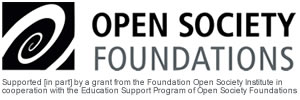Trends
Childhood is increasingly seen as a full-featured stage of life, not only as a prerequisite for adulthood. Relationships in families become democratic and children are being drawn into joint decision-making. With an increase in diversity in society, the patterns of child rearing are also changing. Educational policies are increasingly being adapted to the specific as well as newly identified needs of children.
Challenges
What change shall we see in how upbringing within families and education at schools interact? What "competencies" will parents and teachers have? How will the new knowledge of development psychology and neuroscience translate into the processes of upbringing and education? To what extent can education systems use and combine the different forms of teaching and learning and the opportunities for non-formal education?
| Imagine a FUTURE where there is a consensus to the effect that: | Imagine a FUTURE where there is a consensus to the effect that: | Imagine a FUTURE where there is a consensus to the effect that: |
| A CHILD HAS THE RIGHT TO DEVELOP ITS POTENTIAL | A CHILD HAS THE RIGHT TO BELONG | A CHILD HAS THE RIGHT TO BE TAKEN CARE OF |
| Each child is an individual personality that should be led to fully develop its own potential. Free space should be created so that the child has a chance to fulfill its own needs and interests. | Every child is born into a certain community and it should be led to create a variety of relationships and networks. The child should be given a chance to find a way to make a difference in their community together with their peers. | Every child can be beneficial to society, and therefore needs to be brought up to embrace active citizenship. The child must be given equal opportunities to find a way to make a contribution to society’s development. |
| What is appreciated in learning is originality and exceptional performances. To the maximum extent, autonomous learning and discovery are supported. The child has to be able to try everything out to determine what it is best at. | What is appreciated in learning is adaptability and specialization. To the maximum extent, group learning of children of different ages is supported. Children spend a lot of time together; they play, communicate and collaborate. | What is appreciated in learning is versatility and cooperation. To the maximum extent, encouragement is given to the transfer of knowledge and the development of skills that are useful to society. |
| The most important is not to be afraid – what does not kill you makes you stronger. | The most important is to have a lot of friends – you never know when they will come handy. | The most important thing is to see the whole – you can never achieve more alone than with others. |
| Difficulties burden those children whose families do not provide a sufficiently stimulating environment. | Difficulties burden those children who do not feel comfortable in their group or enjoy solitude. | Difficulties burden those children who show exceptional talent or want to do something different than others. |
| A child who is not ambitious and does not work to become better will face difficulties in adulthood. | A child who is not listening to others and does not care about their surroundings will face difficulties in adulthood. | A child who does not learn to fit into society will face difficulties in adulthood. |
OUR RESEARCH
Childhood is a strong value in Slovakia; its importance in the life of a person is acknowledged by 48% of people compared to 24% who think that childhood is just a preparation for adulthood. However, the idea is still not too widely accepted that childhood and adulthood are equally valuable. Approximately 40% of people think that kids have to first learn to be obedient and they will gain respect as they get older. Only a third of people believe that children deserve the same respect as adults.
OTHER RESEARCH
In Slovakia, the decline in birth rates began in the early 1980s and has continued. An important trend is also the long-term increase in the average age of mothers. Most babies are born to mothers in the age group 25-34 years and compared to the past, the rate of births of mothers aged over 35 years is also rising.1
In the next 20 years, the number of births is estimated to drop from the current number of over 60,000 to about 40,000 per year. According to forecasts, in 2035, the number of children at pre-school age will fall from the present 175,000 to around 130,000 children, which is a decline by slightly more than a quarter. 2
„Will our children wish to have children?“ a workshop participant in Košice
In 2014, almost 40% of children were born out of wedlock. At the same time, there is a certain transformation of family types because the number of children in families is falling. According to the population census in 2011, up to 46% of children lived in families with no siblings. 3
Three quarters of people in Slovakia are convinced that children must love and respect their parents, regardless of their merits and demerits. Up to 87% of people think that if a parent is seriously ill, it is the duty of children to take care of them. 4
„Childhood flies by very fast. In the future, children will become mature sooner. We will expect of them too much.“ workshop participant in the town of Pezinok
The qualities that parents should try to develop in their children are mainly hard work (82%) and a sense of responsibility (72%). While hard work was an important value in raising children already at the beginning of 1990s, a sense of responsibility is a value that is gradually on the rise. Raising children to become independent is also very important to people (66%) and has not changed over time. On the other hand, tolerance and respect for others are important only for less than half of the population and these values are declining gradually. 5
Most recently, the involvement of parents in raising their children has decreased significantly. This is linked primarily to the fast changes in society and the increasing pressure on parents at work. Parents must work hard and perform strongly as individuals, which affects the amount of time they can spend with their children. 6
GOOD TO KNOW
Researchers from Harvard University studied how children cope with stress and failure in life. They explored various strategies that help children cope with obstacles and increase their resilience to crisis situations. It turned out that a key factor in growing their resilience to stress is a stable, positive relationship with at least one adult. With insufficient positive relationships with adults, a child's brain develops differently than it does in favorable conditions, and such a child may be unable to learn to cope with stress even in adulthood. 7
„One primary school banned pupils in its internal rules to dye their hair, use eyeliners or nail polish, to wear extravagant hairstyles and clothes, have body piercings, or a disproportionate length of the hair for boys. Yet, appearance must be considered a manifestation of the personality of each person, not excluding children. The school may interfere with the privacy of their pupils only to the extent permitted by the School Act or other applicable laws. Efforts to put a limit on the maximum length of hair for boys cross those boundaries.“ Jana Dubovcová, Ombudswoman
„Adults should not shout at us, they should spend more time with us, treat us as equals and listen to our views, because even kids can have great ideas. Parents should trust us more, take care of us, and be role models. Teachers could make school better, give us fewer assignments, and create less stress for us. The politicians should protect us, deal more with our problems, and respect children's dreams. Everything would be easier, if adults listened to our views and took them into account. We wish you cared more about us than the development of new computers or the exchange rate of the euro.“ Statement made by children during the preparation of the Action Plan for Children
„People consider our lives as less valuable. They take the roles of saviors – I will help you, I will solve this. They do not take us as partners. But I don't want sympathy, I want to be able to do something! It does not take much for you to see my disability, it is obvious. But are you able to discover my abilities? Are you able to discover the capabilities of other children with disabilities? Please do it! Consider me and all the other children as your partners. We long for you to take us seriously.“ Dominik Drdul, a secondary school student
„Children can hardly learn to sit still and be quiet. I'm a teacher, but since I have been also a mother, I look at children and childhood very differently.“ participant in Žilina
„Children will always be blamed that they are the spoilt generation.“ a pupil at primary school in Poprad
„The technology will work for us and the kids will just ramble on. Even today they do not have to wash the dishes.“ a workshop participant in the city of Banská Bystrica
Footnotes
[1] ProCeSI – iniciatíva vedcov a pomoc spoločenskej integrácii (2015) Prezentácia Prognostického ústavu SAV, 26.2.2015. Dostupné tu. Ako je to s demografiou na Slovensku. Detí výrazne ubudne. In aktualne.sk, 12.5.2015. Dostupné tu.
[2] Úrad verejného zdravotníctva SR (2015).
[3] Kusá, Z., Tížik, M. (Eds.) (2009) Výskum európskych hodnôt 1991-1998-2008 slovenská a česká spoločnosť. Bratislava: Sociologický ústav SAV.
[4] Tamtiež.
[5] Nadácia pre deti Slovenska (2010) Novo vynárajúce sa potreby detí na Slovensku. Bratislava.
[6] National Scientific Council on the Developing Child (2015) Supportive Relationships and Active Skill-Building Strenghten the Foundationsof Resilience: Working Paper 13. Cambridge: Harvard University. Dostupné ako pdf.



